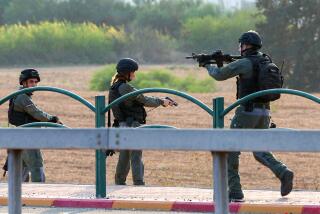Ethiopia-Eritrea Conflict
- Share via
* Reports about Eritrean Americans who have decided to stay in war-threatened Asmara (June 3) should offer a clue about the reasons for the conflict between Ethiopia and Eritrea. With 1/10th of Eritrea’s population at the front lines and the rest willing to do battle against invading Ethiopia, it should be clear that this war is about a small country’s freedom.
Strange, therefore, that the Clinton administration has admonished both sides to seek an immediate cease-fire. The U.S. military knows the relative strengths of the opposing forces, as well as their exact positions. Why does the State Department remain silent about Ethiopia’s invasion? Could it be that “U.S. interest” has been defined as permitting Ethiopia to seize a Red Sea port from its neighbor? If Ethiopia succeeds, the history of the Horn of Africa will be awash in blood and starvation.
JOHN C. RUDE
Los Angeles
*
The tragic war that is unfolding in Eritrea today has its roots when the U.N. failed Eritrea in 1950 and forced a union with Ethiopia, making it the only African country to be decolonized from a European power and then to be recolonized by an African empire. It took 40 years of war and civil strife, the death of tens of thousands of Eritreans and the destruction of the country to reverse that fateful decision. Fifty years later, the Ethiopian army is invading a sovereign, U.N. member state with impunity. Please don’t allow this to happen to Eritrea again.
MESGHINA ARAIA
Union City, Calif.
*
Dan Connell (Commentary, June 2) portrayed Ethiopia as a bellicose Goliath beating up on this poor, helpless David; frankly, that is far from the truth. In 1988, after aggressive bullying in the region, first with South Yemen on the issue of the islands in the Red Sea, then skirmishes with Djibouti and Sudan, the Eritrean leaders invaded Ethiopian territory on the pretext of a poorly demarcated line. Three Eritrean brigades supported by tanks and heavy artillery looted and destroyed schools near Adi Awiala, killing 30 Ethiopian soldiers, while about 10,000 residents fled their homes. This was soon followed by the bombing of schoolchildren in Makale by Eritrean warplanes. Eritrea’s aggressive ambition was to become the region’s macho man, aimed at controlling commerce and geopolitical affairs. The war continued. Ethiopia prevailed.
Connell suggested that Ethiopia’s current aggression was aimed at reducing Eritrea to a vassal state and securing its access to the Red Sea. I don’t know if the denouement of this entangled crisis will lead to that, but for the record, it was Eritrea and not Ethiopia that was the aggressor. I strongly agree with Connell that peace must be mediated immediately.
SIM YALEM
Anaheim
More to Read
Sign up for Essential California
The most important California stories and recommendations in your inbox every morning.
You may occasionally receive promotional content from the Los Angeles Times.













